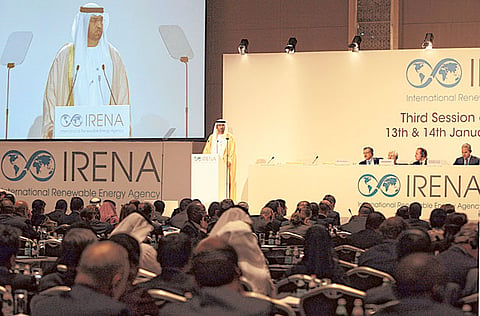Renewable energy capacity increasing globally
Third Irena session sees attendance of more than 800 delegates in Abu Dhabi

Abu Dhabi: Renewable energy delivery systems have increased globally over the last year, a top renewable energy official said in the capital on Sunday.
Despite global economic difficulties, 2012 was declared a “good year for new renewable energy installations” by Adnan Z Ameen, director general at the International Energy Agency (Irena) Assembly in Abu Dhabi.
He was addressing the third Irena assembly, which began its two-day meeting in the capital on Sunday. More than 800 delegates representing about 136 nations, the European Union and 74 organisations gathered at the assembly to discuss achievements and challenges in the renewable energy sector.
Martin Lidegaard, Minister of Climate, Energy and Building in Denmark, who has been elected president of this Irena session, led the proceedings.
The Irena assembly is part of the ongoing Abu Dhabi Sustainability Week, which includes a number of summits to promote sustainable living technologies. These include the sixth edition of the World Future Energy Summit, as well as the first edition of the International Water Summit, which will both begin in Abu Dhabi on Tuesday.
Currently, the Irena sees the participation of 160 member countries. The third edition of the assembly will work at charting a pathway to double the world’s share of renewable energy by 2030.
According to details revealed on the first day of the two-day Irena meet, the installed capacity of worldwide solar photovoltaic sources currently stands at 100 gigawatts (GW), having grown 10-fold over the last five years. The capacity for wind-generated power has also reached 280 GW globally, including more than 100 GW in Europe alone.
“The rapid deployment of renewables, combined with high learning rates, is leading to significant cost declines, and this is helping wind and solar technologies to become competitive with fossil fuels in many circumstances,” Ameen said.
While achievements in implementing sustainable energy sources were highlighted at the session, the Irena director general also pointed out the need for consolidation among energy companies.
In addition, officials also highlighted the benefits of renewable readiness assessments (RRAs), which were conducted by a number of national governments, in collaboration with the Irena, last year. The assessments, undertaken in Gambia, Ghana, Grenada, Kiribati, Niger, Oman, Peru, Swaziland and Zambia, were aimed at enabling the development of country-specific renewable energy deployment strategies.
Ameen added that Irena will also focus on implementing renewable energies across islands and island states in 2013.
“Because of their isolation, small market size and specific energy needs, islands are often perceived as a niche market for energy,” he said.
The Irena will, therefore, work to establish a Global Renewable Energy Islands Network, and look into power storage options on islands.
A number of countries also reaffirmed their commitments towards increasing their share of renewable energy in the next few decades.
While Abu Dhabi hopes to obtain seven per cent of all capacity from renewable sources by 2020, Dubai is working to obtain five per cent capacity from renewables by 2030.
Sign up for the Daily Briefing
Get the latest news and updates straight to your inbox



